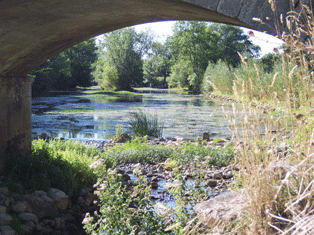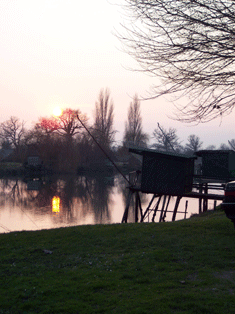The natural anvironment of the catchment area of the Charente
is very diversified : it is made of valleys (Charente valley, Boutonne
valley, Tardoire valley and Bandiat valley), of “prées”
(floodplains), of marshes, as well as of plains and bocages. The
river Charente is lined with corn cultures.

Click
here to see the map of the "pays"
Charente limousine
The river goes through glens of rye and linen fields, through woods
of beeches trees, of chestnut trees, of oaks trees, of birches,
and forms branches and small islands. Grasslands, bocages and pasturelands
surround the river, lined by reeds.
Pays Civraisien
The « pays Civraisien » displays some bocage landscapes,
but also plains and wooded valleys. On the West, there are mostly
cultivated landscapes, with very few trees; on the East, the landscape
is made of heath (small reliefs made of moor and of jennets).
Pays Ruffécois
We find there numerous forests : the one of the Braconne, the one
of Boixe, the one of Tusson… (the wooded areas represent 10
to 35 % of the whole catchment area), and again, islands and small
islands.
Close to the Pays d’Horte and to the river Tardoire
Close to La Rochefoucauld, the landscape is made of Karst and a
lot of the streams disappear under the ground to spring again in
the Touvre. There are many swallow holes and abysses to visit.
L’Angoumois
Plains allow navigation until Rochefort, that is why we find in
this part many locks.
Pays Cognaçais
Between Cognac and Angoulême, Cognac and Pineau vineyards
are almost everywhere.
Saintonge romane
The landscape is mainly made of wide water meadows.
Pays Rochefortais
The land is marshy, because the sea is not far. The marshes, wet
or dry, create sinuous labyrinths. We can see the influence of the
tide on the river in that place, because the estuary is not far.
The catchment area of
the river Charente has got also many wetlands of importance, that
are protected : Zones Naturelles d’Intérêt floristique
et faunistique – ZNIEFF and Sites Natura 2000.
Click
here to see the map of the natural heritage

